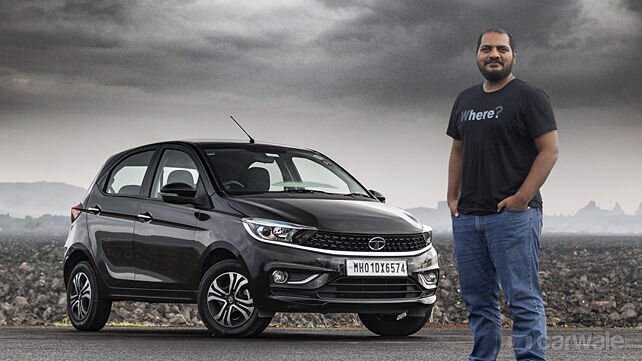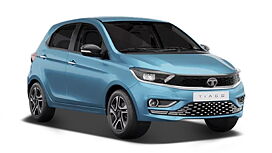Why would I buy it?
- Factory-fitted CNG with all the features
- No difference in performance between petrol and CNG
- Affordable daily running cost
Why would I avoid it?
- Non-existent boot space
- Long queues at CNG pumps
What is it?

Early this year, Tata Motors diversified its portfolio by offering factory-fitted CNG versions for the Tiago and Tigor. Going by the name i-CNG, it serves as an additional choice for those who earlier had to opt for Maruti Suzuki or Hyundai for factory-fitted CNG cars. We drove the Tigor i-CNG in January, and have spent a comprehensive time with its hatchback sibling – the Tiago i-CNG.

In terms of appearance, not much has changed. We had with us the range-topping XZ+ versions of the Tiago, which gets an ‘i-CNG’ badge on the tailgate and that’s all the changes you’d find over the standard version. The last cosmetic update for the Tiago came in 2020, and it still looks handsome soldiering on. What’s more, the CNG options for the Tigor and Tiago range across all the variants. So, there’s no compromising on features when opting for the CNG-powered trim over the standard one.

What’s new inside and what's on the feature list?

There’re no noticeable changes inside the Tiago i-CNG over its standard counterpart. You get a dedicated button on the centre console to turn on/off the CNG mode. And the new CNG gauge is displayed on the top corner of the all-digital instrument cluster. Then, the cabin of the Tiago continues to be a spacious one, with good practicality thrown in. There’s a decent amount of headroom both in the first and second rows. Integrated into the middle of the dashboard is a seven-inch touchscreen which is no different in terms of the user interface from the one available in more expensive Tatas.

Moving to the seats, they are soft and comfortable and offer good support with height adjustment for the driver. However, at the back, there's no adjustable headrest. Some under-thigh support for rear passengers would have helped as well. The rear passengers get a single cup holder mounted between the front seats and folding armrest, but no seatback pocket. Even the two cup holders on the centre console should have been larger to accommodate normal-sized water bottles.

The space on the door pads is surprisingly large though. Lastly, the boot space of the standard Tiago isn’t large at 242 litres – all of which has now been compromised to fit in the CNG tank. The spare wheel which sits below the tank is also accessible only by folding the rear seat backrest. This inconvenience is a trade-off for the lower running cost of the CNG-powered cars. And if you still want some boot space, you can opt for the Tigor i-CNG which has some room to spare despite the CNG tank.

Now, this is the top-of-the-line XZ+ trim which ticks most of the boxes on the feature list. This includes 14-inch steel wheels with a stylish wheel cover, indicators on ORVM, chrome-finished door handles, projector headlamps with LED daytime running lights, rear wipers, and a roof-mounted spoiler.

On the inside, there’s an all-digital instrument cluster, auto AC, fabric seats, tilt-adjustment steering, piano-black inserts on the dashboard, body-coloured inserts around air-vents, follow-me-home lamps, keyless entry, electric ORVMs with an auto-fold, cooled glovebox, and all four power windows with one-touch down for the driver. Plus, the seven-inch touchscreen is paired with a Harman sound system with four speakers and four tweeters. Its ConnectNext interface is compatible with AppleCarPlay and Android Auto too.

As for safety, the Tiago is a four-star NCAP recipient and so is the i-CNG version. The standard safety equipment includes dual airbags, ABS with EBD and corner stability control, a rear parking sensor, and a puncture repair kit, and the XZ+ trim also gets a rearview camera. Additional safety measures for the i-CNG include the provision of a fire extinguisher under the front passenger seat, as is the mandate. There's also a micro-switch that automatically turns off the engine when the fuel cap is opened and the motor won't start until it’s closed. The CNG cylinder also gets leak and thermal protection along with a pressure release nozzle.
What’s it like to drive?

Starting up in the CNG mode, the 1.2-litre Revotron three-cylinder petrol engine doesn’t feel any different when switched to petrol and back. Sure, there’s slightly less noise felt in CNG and the vibrations are also marginally less in the petrol mode. But these differences are apparent only when you go looking for it and are far from being a deal breaker. Even the shift between petrol and CNG fuel supply is seamless. So, in everyday driving conditions, you wouldn’t even notice the dissimilarity in the way the engine behaves in the two fuel supplies. On the spec sheet, there’s a drop in power with CNG. While the engine makes 84bhp/114Nm when driven in petrol mode, the CNG mode is good enough for 72bhp and 95Nm.

To see how close the performance is between the two modes, we got the Tiago tested under the VBox. And we found that the 0-100kmph sprint in the petrol mode took 15.90 seconds, and it’s not drastically quicker compared to the sprint in CNG mode which took 16.79 seconds. Second, the in-gear acceleration timings aren’t too far off either. The 20-80kmph in third gear in petrol was 15.02 seconds and in CNG it was 15.50 seconds. Similarly, 40-100kmph in fourth gear took 23.44 seconds in petrol and 24.18 seconds in CNG. We did the same test with five people on board and the change in performance was barely noticeable in both modes.

As for the driving feel, the three-cylinder engine is friendly for everyday drivability with linear power delivery. The controls are light and easy to operate. And there's little to no stutter from the motor even when you are a gear too high. Although there’s a need to constantly work the gear to get the optimum performance, the motor is capable enough to go over steep slopes and crowded flyovers with five passengers on board without any trouble. For a sedate everyday city driving, the Tiago CNG won’t be bothersome and spending needlessly long hours in uncalled-for traffic won't be stressful either.

We tested the Tiago CNG under our standard testing cycle and found that it could do 17km/kg in the city run and returned 33km/kg out on the highway. The claimed combined figures are 26.49km/kg, and we achieved close to 21km/kg in real-world conditions. Moreover, our real-world range test on it gave us 227km on a CNG tankful.

Now, with the added weight of the CNG cylinder in the boot, the rear suspension appears to have undergone some tweaks, but for good. You can hear the suspension working more than you can feel and despite the added weight, the ground clearance is fairly good at 168mm. Meanwhile, the steering is smooth but isn't very quick if you intend to have some fun around corners. It’s not progressive but does a decent job for a family hatchback that’s focused on everyday usability.

How does it compare and what’s the price?

Prices for the Tiago i-CNG range between Rs 6.30 and 7.82 lakh (ex-showroom). And the i-CNG variants are Rs 90,000 more expensive than the petrol-only derivatives. So, those who are looking to buy a practical city runabout but are apprehensive about the rising petrol prices can opt for the Tiago i-CNG instead of the alternatives that include the Hyundai Grand i10 Nios CNG and Maruti Suzuki Celerio/Wagon R CNG. Over its competitors, the Tiago has better feature provisions spread over more variants. Then, it’s good to drive as well and the four-star NCAP safety rating might turn many in Tiago’s favour.
Pictures by Kapil Angane and Kaustubh Gandhi

































